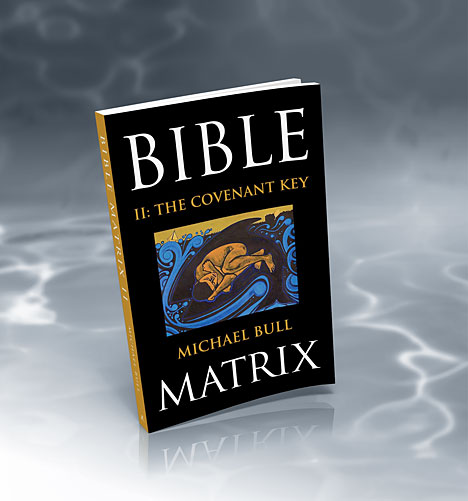The Covenant Key
“Let’s face it, even daytime television
is more inspiring than your sermons.”
Ray Sutton’s 5-point Covenant model is crucial when it comes to making sense of the judgments of God, both the blessings and the curses. As he says in his book That You May Prosper, “Everyone talks about the Covenant, but nobody does anything about it.”
When I was writing Totus Christus, I thought it was only natural that the 7-point Creation pattern and the 5-point Covenant pattern could be combined. Transcendence is Light. Testing and Ethics matched. The positive and negative Sanctions were quite obviously the two goats on the Day of Atonement (Ebal and Gerizim). So it was only a matter of figuring out how the 5 of Words becomes a 7 in history. [1]
I recently found that James Jordan covered this in his occasional paper, An Introduction to the Seven-fold Covenant Model with Notes on the Five-fold Covenant Model. But how many people have read that? Show of hands, please. How to get this across at a popular level?
John Piper says that pastors should be compassionate men who have backbones of steel. Doug Wilson says that some churches are doctrinally pure, but unloving. They are all backbone, all bone, no flesh. Other churches are all flesh, all gooey love, a body with no skeleton. Sin divides Law-Word from Life, but God is able to put these two together, and it takes a miracle (Ezekiel 37). It is the work of the Spirit to form and fill, to marry head and body, structure and glory.
Eric Rauch did write a great summary of Ray’s ground-breaking book a while back, [2] but Ray’s technical approach attracts the retentive among us: the lawyers. I think it was Jordan who remarked that the Bible has been in the hands of the lawyers for 1000 years — far too long. Lawyers love rules and regulations. They like to have all the boxes ticked. They are legal accountants. Their books get written and filed, just in case the IRS does an audit. (I don’t think Ray’s book is that technical, but it’s still way above the level of most Christians.)
Sure, the Lord is a lawyer, but none of His books is dusty-on-the-shelf. His laws are Bridal. He might give us a long list of Covenant conditions, but then He gives us narrative, and we see how the same pattern plays out in history. Word becomes flesh, and flesh is filled with Spirit. The lawyers rarely get beyond Word, so the saints turn to “Christian” fiction, and the surrounding post-Christian culture turns to Buffy, Harry Potter, House, People and Manga for their stories. Let’s face it, even daytime television is more inspiring than your sermons.
That’s what I want to achieve with this book: to give a detailed summary of Ray’s book, but then tie it to the Bible Matrix. After all, postmoderns love narrative. Showing how the Law is inseparably married to the narrative would have great benefits. And I pray the Spirit would use this to open more Christians’ minds to the wonders of the Torah and the foundations it lays for the rest of the Bible.
The benefits for interpretation are great: we begin to see Israel’s sins in the light of the transgressed documents, and to identify the Covenant lawsuits as what they are, an area where most evangelical scholars fail dismally. (Why do they insist on ignoring literary structure and allusion? Ah, they have the minds of lawyers. They see the letter and not the Spirit!)
And the benefits for application would be greater: Covenant obedience and postmillennialism would suddenly make sense (and not be branded as works righteousness and right-wing political fantasy respectively). Instead of being suckered by Christianised socialism (Baalism) [3], teaching a prosperity gospel (materialism), or fighting it with a poverty gospel (gnosticism), the modern evangelical church would understand “good success” as God does — spiritual and material prosperity within a transformed church and state.
If you have any thoughts on what would make this a good book (besides canning the idea altogether), please let me know. Eric has very kindly agreed to the use of his article.
Hopefully, it will be better than Matrix sequels tend to be.
Do you think THE KINGDOM KEY would be a more suitable subtitle?
______________________________________
[1] See Lambs in Limbo.
[2] See A Jaw-Dropping Book.
[3] See Baal’s Stimulus Package.



























October 23rd, 2010 at 5:06 pm
When does it start rolling off the presses?
October 23rd, 2010 at 5:09 pm
I have to write it yet. How about you set the writing deadline for me? Some time early next year.
October 23rd, 2010 at 9:29 pm
How about January 1st? Just kidding. January 31st will be fine.
October 23rd, 2010 at 9:33 pm
OK. You’re on.
December 4th, 2010 at 4:56 pm
I think “The Covenant Key” is a better subtitle. The term “covenant” has a very broad evangelical audience whereas “kingdom” seems a little more eclectic given evangelicalism.
December 4th, 2010 at 4:58 pm
Oh, and the “That You May Prosper” link is dead. I’d really love to get my hands on a physical copy of Sutton’s book but they seem few and far between.
December 4th, 2010 at 7:19 pm
Thanks!